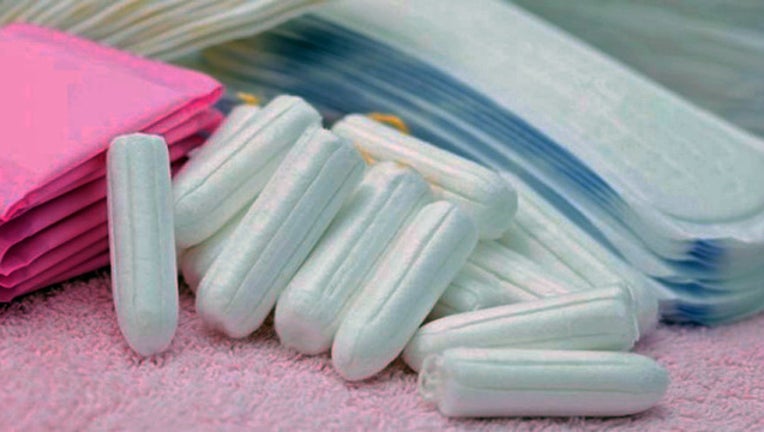Feminine products in prisons get attention

TALLAHASSEE, Fla. (NSF) - It’s something most women rarely chat about with strangers.
But Valencia Gunder is walking the halls of the Capitol talking about menstruation.
Specifically, Gunder’s leading a discussion about the struggles incarcerated women in Florida face because they don’t have adequate feminine products like tampons and sanitary napkins.
Gunder, a former inmate who’s now a lobbyist for the group Dignity Florida, is pushing a proposal that would require state prisons and county jails to make tampons and napkins more readily available to female prisoners.
“We are not asking for a luxury, state of Florida. We are asking for bare necessities. Women should not have to use extra pairs of socks as pads. Women should not have to use all of their tissues. Women should not have to be embarrassed to ask for extra sanitary napkins and tampons,” Gunder told reporters during a recent press conference in the Capitol.
The state Department of Corrections already has a rule requiring female inmates to have access to “adequate” feminine hygiene products.
The agency “is committed to ensuring the dignity and fair treatment of all incarcerated individuals in Florida,” spokeswoman Michelle Glady said.
“Our current policy and practices provides feminine hygiene products at no cost to inmates, necessary health and comfort items, and has search policies in place that are committed to ensuring inmates privacy in respect to their gender,” Glady said.
But Gunder and other advocates say guards sometimes deny requests for pads --- state prisons don’t give female inmates tampons --- as a way of punishing or humiliating women behind bars.
“It’s just humiliating, in general, (to be denied) things that you need,” Gunder, 34, said in a recent interview.
Female inmates also say the napkins given away by jails and prisons often don’t do the job.
The proposal (HB 49 and SB 332), called the “Dignity for Incarcerated Women Act,” has received bipartisan, unanimous approval from three subcommittees and committees in the House and Senate. It is scheduled to be heard Tuesday in the House Justice Appropriations Subcommittee.
The proposal would require prisons and jails to make “health care products” --- including tampons, moisturizing soap that is not lye-based, toothbrushes and toothpaste --- available to female inmates “at no cost to the woman in a quantity that is appropriate to the needs of the woman.” The products must be available “in common housing areas,” so that women don’t have to request them from guards.
Tampons and pads are available at some prison or jail canteens, but not all women can afford to purchase the products, Rep. Shevrin Jones, a West Park Democrat who is sponsoring the House measure, told a committee recently.
Incarcerated women are being “forced to make the impossible decision of constructing your own menstrual products, using anything from clothing or notebook paper, in place of a tampon,” Jones said, before the House Criminal Justice Subcommittee unanimously signed off on the bill.
“Without adequate access to clean, hygienic menstrual products, you may face serious health consequences. This happens every single month, and for some with irregular cycles, more frequently,” he added.
The proposal also would require that pat downs and strip searches of inmates be done by female guards and would ban male corrections officers from entering showers, restrooms or other places where incarcerated women may be undressed, policies that are already in place in some facilities.
But the legislation goes further, by requiring male guards to announce their presence after entering women’s housing units.
According to a staff analysis of the proposal, state corrections officials say it’s already their policy that strip searches of women be conducted by female guards and that guards of the opposite sex announce their presence at the beginning of each shift.
But Gunder said the regulations need to be put into law to ensure that the procedures are followed.
“This is a policy. But then you’re hearing hundreds of stories saying the opposite, or that people are not following the policy, and that’s why we want to make it law. And if you’re following procedures, then you should have no problem with the law,” she said.
Gunder, who’s the criminal justice program manager at the group New Florida Majority, said she first spoke about her negative experience as an inmate with her period while at a national conference two years ago.
“It was one of the hardest stories I ever had to share. It was extremely embarrassing. It’s something I don’t necessarily like to talk about a lot, but we can help the thousands of women who are incarcerated. But it is extremely hard because it’s something that people don’t talk about, outside of to a mother,” Gunder said.
After her remarks, Gunder said she met Topeka K. Sam, who’s a leader in the national “Dignity for Incarcerated Women” movement and discovered that women throughout the country were already working to make sure incarcerated females had access to adequate feminine products.
“It was a freeing moment for me and what was so amazing was that this group of women who all were incarcerated and they were, like, we know exactly what you’re talking about, and this is what we’re doing to fix it,” Gunder said.
Sen. Jason Pizzo, a Miami-Dade County Democrat who is sponsoring the Senate version of the bill, has a more philosophical approach to the legislation.
Pizzo, a former prosecutor, says there’s a “social contract” that assumes that someone who’s been found guilty of a crime or has admitted to committing a crime will be punished.
“But it also contemplates that we expect this person to be rehabilitated. You’re not living up to that part of the social contract if all you’re doing is unilaterally punishing somebody by not treating them humanely,” he said.
Information provided by The News Service of Florida.

